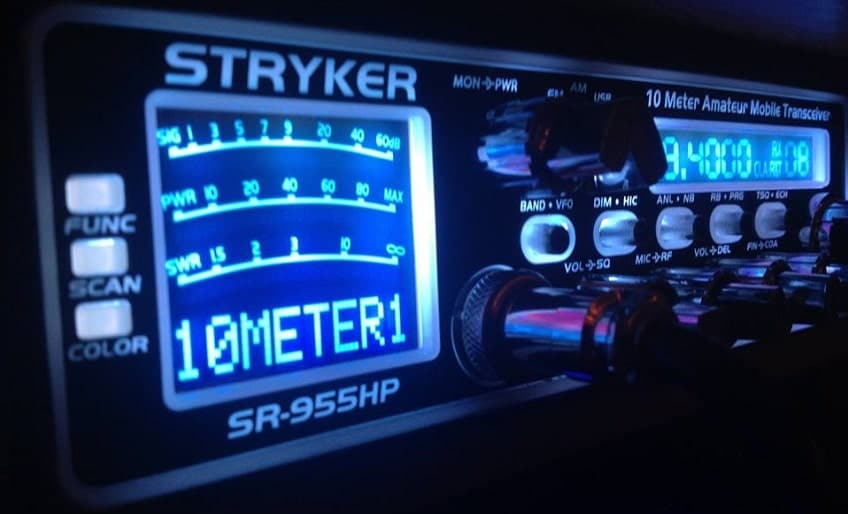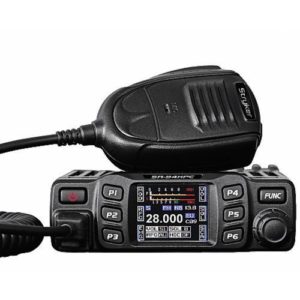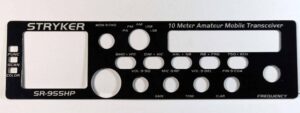Ham radio is a great hobby that weaves together technical skills, public service, and a global community – but it requires passing a licensing exam that might seem tough at first. This guide provides tools to help you pass the ham radio test with flying colors. Read on for insights, tips, and resources to help you confidently navigate your way to a successful ham radio license.
1. Understand the Exam Structure
2. Review the Question Pool
3. Use Flashcards
4. Take Practice Exams
5. Join a Study Group
6. Understand Basic Electronics
7. Learn the Federal Regulations
8. Get Hands-On Experience
9. Stay Consistent with Your Studying
10. Give Yourself a Deadline
Reward Yourself with the Stryker SR-955HPC
What are the Three Ham Radio Licenses?
- The Technician Class license provides access to all of the amateur VHF and UHF radio bands, and some access to the high-frequency (HF bands). Those with Technician licenses use a portion of the 10-meter band for voice and digital communications.
- General Class license holders enjoy all VHF and UHF privileges and more HF privileges for voice communications. If you are interested in communicating globally, you should plan to get your General license once you’ve become familiar with your abilities under the Technician license.
- The Extra (or Amateur Extra) license is the top of the line. These amateur radio license holders have full access to all amateur frequency bands.
Who conducts the amateur radio license exam?
In the United States, the amateur radio license exam is conducted by volunteer examiners (VEs) accredited by the Federal Communications Commission (FCC). VEs are typically experienced amateur radio operators who voluntarily administer the exam to prospective radio enthusiasts. The volunteer examiner coordinator (VEC) oversees the VEs, ensuring the integrity of the exams and the consistent application of FCC rules and regulations.
Candidates must register in the FCC CORES system and receive an FCC Registration Number (FRN) before exam day. Learn more in this helpful FCC guide: New Users Guide To Getting Started With Universal Licensing System (ULS) Contact one of the VE team members in your community to register for FCC license examination. You can search for an exam session in your area through the American Radio Relay League (ARRL). In-person exams are the most common type of test, although remote exams are sometimes available.
1. Understand the Exam Structure
The first step to passing any exam is to learn about the overall structure of the test. So what is the test like for a ham radio license? For the Technician or General license, the Amateur Radio License examination consists of 35 multiple-choice test questions pulled from a pool of 300 standard questions. It tests your understanding of radio technology, operating practices, and regulatory aspects of amateur radio. Subjects covered may include basic electronics theory, radio wave behavior, communication modes, antenna design, and safety procedures. You must achieve a minimum score of 74% to pass the test and earn your license.
2. Review the Question Pool
Since the question pool for the ham radio exam is public knowledge, you can review it thoroughly and understand the types of questions that may come up. The National Conference of Volunteer Examination Coordinators (NCVEC) provides a pool of questions and answers. Keep in mind that the test is not designed to keep people from getting licensed – it’s there to make sure you know how to responsibly use the technology you’re being given access to.
3. Use Flashcards
A pool of 300 questions is pretty intimidating! There are 10 sub-pools of questions, so we suggest you break down the information into these smaller chunks. Flashcards are a great way to memorize. You can make your own flashcards using a tool like Quizlet. Just going through the steps of making the Quizlet will help you retain the information. You can take advantage of pre-made study guides as well. Check out Mometrix Test Preparation for Technician study tools. Once you master one section of questions, attack the next!
4. Take Practice Exams
After studying individual topics, try taking a practice exam. Regular practice tests will help gauge your overall understanding and improve your time management skills. Check out HamExam.org for sample amateur radio practice exams. HamStudy.org has an app so you can take sample tests on your phone anytime you have a few minutes.
5. Join a Study Group
Collaborating with others preparing for the same exam can provide new insights and make your study sessions more effective. Your local ARRL group likely offers test preparation classes in your region. Check out the ARRL search tool to see if there’s one near you. You’ll also meet fellow hammies and get a start in the ham radio community!
6. Understand Basic Electronics
Basic electronics knowledge is essential for the licensing test. Take time to learn concepts like Ohm’s law, circuits, and radio wave propagation. And this knowledge will help you when you begin setting up your own ham radio and antenna. There’s a lot of technical know-how behind a high-functioning ham radio!
7. Learn the Federal Regulations
As a radio operator, you must know the FCC’s rules and regulations regarding amateur radio operations. The regulations exist so that millions of people around the world can communicate together with minimal interference.
8. Get Hands-On Experience
Nothing replaces hands-on experience, so spend time with a current ham radio operator! You’ll find that the ham operators love to share their knowledge. Use the resources in this article to find a local person or club and get connected with them. Connecting through a ham radio Facebook group is another way to get expertise from long-time ham operators. This experience can provide a practical understanding that’s hard to get from reading alone.
9. Stay Consistent with Your Studying
Achieving any goal requires effort over the long haul. Although the test has only 35 questions, those questions come from a huge pool of information. So make a study schedule and stick to it. Just like your mom told you, regular study is more effective than cramming.
10. Give Yourself a Deadline
Passing the test is definitely within reach! Don’t drag out the process. If you go ahead and sign up for a test date, you’ll have a specific goal ahead and a local contact too. Both of these will help motivate you to study. Knowing that 74% is passing, and you have some room for mistakes can also help you avoid the trap of perfectionism.
Reward Yourself with the Stryker SR-955HPC
Once you have your license, you’ll be ready for a high-quality, 10-meter radio – look no further than the Stryker SR-955HPC! The newest version is a standout, boasting exceptional audio clarity, increased robustness, and innovative features that set it apart from the rest. With Stryker’s unwavering dedication to quality, the SR-955HPC will continue setting the benchmark for other 10-meter radios.
Our warranty and stellar customer service make us a top choice among both professional and amateur operators who expect the best from their radio. For best-in-class 10-meter radios, CB antennas, connectors, and accessories, Stryker Radios has you covered. Shop online or find a store near you.




